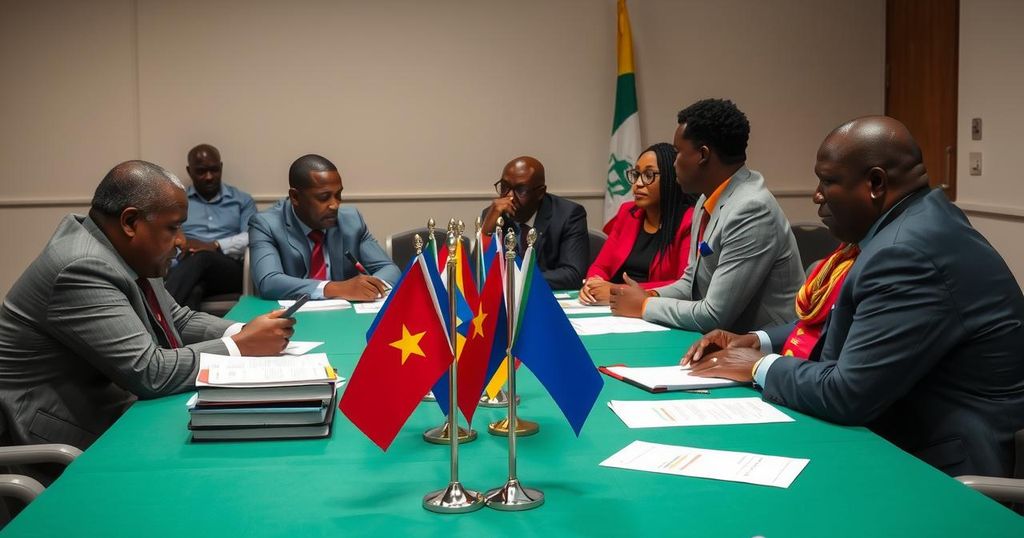The UN Security Council discussed ending violence in eastern DRC, led by Bintou Keita. She reported on armed group activities in North Kivu and Ituri, and commended Angolan mediation efforts. Upcoming leadership summits are expected to enhance peace talks. With notable governance reforms initiated, she called for unity among stakeholders to maintain stability amid security challenges and humanitarian crises exacerbated by climate change.
On Monday, the United Nations Security Council convened to discuss the pressing need to end violence in the eastern Democratic Republic of the Congo (DRC). Bintou Keita, the UN Special Representative for the DRC and head of MONUSCO, addressed the council about the ongoing political unrest and security issues in the North Kivu and Ituri provinces, accentuating the activities of armed groups such as the ADF, M23, CODECO, and Zaïre. Highlighting recent mediation efforts by Angola, she emphasized the importance of aligning local and regional initiatives to achieve enduring peace.
As part of upcoming efforts, a summit scheduled for December 15 will bring together leaders from Angola, the DRC, and Rwanda, providing a platform to reiterate significant advances made in stabilizing the situation. Despite progress, Ms. Keita underlined the necessity for comprehensive support of the Angolan-led initiatives, ensuring that grassroots recommendations from parties affected by conflict, particularly women, are integrated into peacebuilding strategies.
Recent elections in the DRC prompted governance reforms aimed at enhancing social services and reinforcing the rule of law. Keita urged cooperation among stakeholders to mitigate tensions surrounding constitutional revisions, thereby preserving the country’s trajectory towards stability. Furthermore, she commended the establishment of the Reinforced Ad-hoc Verification Mechanism (R-AVM) by Angola and MONUSCO to monitor the ceasefire agreement with Rwanda, crucial for maintaining regional harmony.
Regarding the security landscape in the eastern DRC, Ms. Keita expressed concern over the M23 group’s unlawful territorial control and the ADF’s deadly impact on civilians. Although attacks by CODECO and Zaire have decreased recently, civilian protection is paramount due to ongoing violence, which often correlates with struggles over natural resources. She called for regional coordination against the illicit exploitation of these resources to mitigate armed group influence.
The adverse effects of an unstable security environment exacerbate the humanitarian crisis in the DRC, particularly with the ongoing challenges posed by climate change and epidemics. An update on funding for humanitarian efforts revealed an improved funding status for the 2024 Humanitarian Response Plan, indicating positive trends for support amidst the crisis.
As the international community observed the conclusion of the 16 Days global campaign against violence towards women, Ms. Keita highlighted the urgent need for continued prevention of gender-based violence. With over 90,000 documented cases in the DRC this year, including a significant proportion in North Kivu, she praised the government’s commitment to combatting impunity and assisting victims through reparations.
Moreover, Ms. Keita reaffirmed her dedication to a zero-tolerance policy regarding sexual exploitation and abuse by UN personnel, emphasizing accountability as a collective responsibility. With the support of the International Criminal Court’s renewed investigative focus on alleged crimes in North Kivu, a hopeful narrative emerged from her meetings with women and persons with disabilities seeking lasting peace and returning to their homes with dignity.
Thus, the ongoing efforts by local, provincial, and international entities represent a concerted approach to restoring peace and security in the DRC, underlining the voices advocating for transformation as critical to achieving stability and development in the region.
The Democratic Republic of the Congo has faced prolonged instability and violence in its eastern regions, primarily affecting North Kivu and Ituri provinces. Various armed groups have operated in these areas, exacerbating the security challenges and leading to widespread humanitarian crises characterized by displacement and resource conflicts. The international community, led by the United Nations, continues to advocate for peaceful resolutions and reforms to address these persistent issues, backed by regional partnerships such as those with Angola and Rwanda. Governance reforms and humanitarian efforts further complicate the efforts to establish a lasting peace.
In summary, the UN Security Council meeting underscored the critical imperative to end violence in eastern DRC. Ms. Bintou Keita’s insights highlighted both the challenges from armed groups and the significant collaborative efforts underway towards peace. Coordinated regional actions, local advocacy, and comprehensive support from international stakeholders are pivotal to reversing the cycle of violence and fostering stability. The humanitarian implications of the conflict necessitate sustained attention, particularly with regard to gender-based violence and the well-being of marginalized communities. Together, these efforts could lay the foundation for a peaceful future in the DRC, reinforcing the essential role of community voices in shaping peace initiatives.
Original Source: news.un.org






